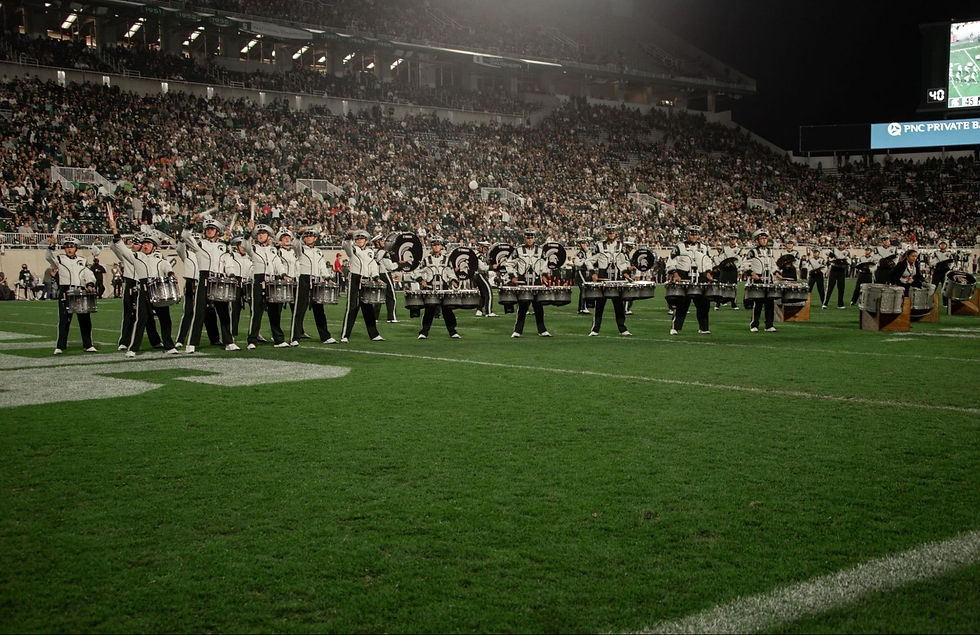
Day in and Day out, the Spartan Drumline eats, sleeps, and breathes drumming. Over the long hours, intricate compilation of notes, and physical toll the body takes on, the drive to perform like the best college drumline seeps into the core of their practice.
Dr. Weber is the starting point of their dedication. Starting his position in 1996, Dr. Weber has consistently built a community where people work efficiently and have fun doing it. To him, one of the most important parts of their technical practices is teaching the snares how to play on the racks used in Everybody’s Everything. Specifically speaking, the racks consist of electronic pads which you can program to sound with whatever tonality is needed. Therefore, on the racks they can be tuned to sound like a bass drum, or toms. With players having specific places where they play on the bass drum sounding pad, and the high and low tom sounding pad, the collaboration of notes sound like a drum set. In Dr. Weber’s experience, “with learning on the rack, it's generally a little slower because the Snare drummers are very used to playing one surface and it's right in front of them. And then to move around is a completely different thing. It's learning a new instrument, essentially. So it does take a little bit of time. It works really well for the Snares. The tenors are used to moving around on different instruments, but with all those drums, if they don't really fit well, adding on the racks. The snares work really well there and it takes them a while to learn. So it is a combination of learning sheet music and also by reps.”
Another iconic feature of the MSU Drumline is their Third Quarter Cheer. In the interview with Dr.Weber, I asked how he gets inspiration for arranging and choreographing the performance during the third quarter of the game. To him, “A lot of times I look at that as a collaboration with the students, and so I was interested in doing something with the racks because we're doing so much with it anyway. And the racks, by the way, are sort of a pain because you have people moving out and you have speakers. So our assistant, Peyton Stramel, is amazing because she's done so much work taking things out, and the Grad Assistants do a lot. But I thought it would be nice to do something there because I don't listen to a lot of rap, typically. And so I asked and Kato Ruiz mentioned Pop Smoke, so I was like, okay, I want to listen to a few tunes. And he sent a couple of links over including the one that we chose. So, yeah, I listened to it. And then you can take some samples and pull them out of the tune, and then you can program that into a laptop. And then we have a kind of a DJ ish set up with this machine, and so you hit these pads, and it triggers a specific sample. It's pretty fun.”

From a student perspective, Alex Roy, Bass Drum, remarks, “being a part of the drumline has made my college experience busier, but also more fulfilling! When we arrive back on campus early to start our season, the excitement is like nothing else. Being in the band makes you feel like you’re in the center of the MSU community; a tangible part of the school’s spirit. I feel this even more as part of the drumline. Our presence gets people’s attention. The time commitment and added craziness to my schedule is worth it to be on one of the best college drumlines in the country.” In addition to this, he speaks about his favorite memory of Drumline. To him, “I will always remember performing with the MSU Drumline in Austria. Warming up in Salzburg under a statue of Mozart was surreal. The most incredible part was that no one knew what they were about to hear. Our visit to that region was the first exposure of that culture to college marching bands from the US. Performing “The Series” in Austria was extra special. We have been playing that set of cadences since the 1960’s, but this was the first time— and likely the only time— that it would be heard on those streets.”

Another notable insight is from Stephen Hostetler, Snare. To him, “As snare drummers, we are usually expected to only have one playing surface, but at MSU we play the racks every year for Everybody’s Everything and this year we have had rack parts for two halftime shows and our 3rd quarter cheer. Everyone honestly differs in their level of comfort with learning and playing music on the rack, but it ultimately comes down to repetition for everyone. Take it one measure or one beat at a time and repeat until you’ve got the whole piece. I personally can’t think of a favorite memory from being on drumline. Each season I have been in the SMB has been distinctly unique in the combination of personalities, music writing, drill, and social events, but one thing that always remains constant is that every day, even the crappy ones, are great.”
Overall, the hard work and dedication to the group is unmatched. To reiterate a wholesome quote from Dr. Weber, “everybody should love what they're doing and share that with others.”
Go Green! Go White!